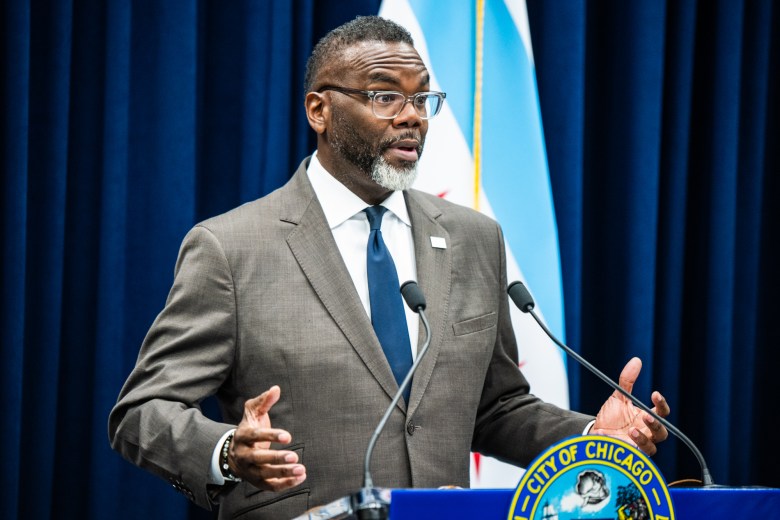Business
Chicago Mayor Redirects Funds to Combat Food Insecurity Amid SNAP Cuts

In response to recent cuts in Supplemental Nutrition Assistance Program (SNAP) benefits, Chicago Mayor Brandon Johnson has signed an executive order to redirect city funds toward food banks and non-profit organizations tackling food insecurity. This initiative comes as demand for food assistance has surged following the temporary suspension of SNAP benefits during the recent federal government shutdown.
The executive order aims to enhance funding for food assistance programs, which have been under significant strain. With nearly 2 million Illinois residents relying on SNAP for essential groceries, the disruption has raised urgent concerns about hunger in the community. Johnson stated, “We cannot accept Chicagoans going hungry as a result of the Trump administration’s war on poor and working people.”
Immediate Impact of SNAP Changes
The federal government recently reopened after a historic 43-day shutdown, which halted SNAP payments. As states begin to process these payments, Illinois is expected to distribute full monthly benefits to recipients by November 7, 2023, according to the Illinois Department of Human Services. However, significant changes to the SNAP program are set to take effect starting December 1, 2023.
Under the new eligibility requirements outlined in President Donald Trump’s “Big Beautiful Bill,” many recipients aged 18 to 65 will need to demonstrate employment, educational engagement, or participation in a work training program to qualify for benefits. Previously exempt groups, including unhoused individuals and veterans, will now face strict work requirements, leaving numerous individuals and families vulnerable.
According to various estimates, cuts to the federal food assistance program could total approximately $186 billion.
As the city grapples with these challenges, the funding redirected by Johnson’s executive order will also support local businesses adversely affected by the loss of SNAP-related purchases. Restaurants and community organizations across Chicago have stepped up to provide free meals for those left without food assistance, underscoring the community’s resilience in the face of adversity.
Community Response and Future Outlook
While the precise amount of city funding allocated to these food assistance efforts is not disclosed, Johnson’s office emphasizes the importance of collaboration with philanthropic partners to ensure food reaches neighborhoods in need. The initiative reflects a proactive approach to mitigating the impact of federal policy changes on Chicago’s most vulnerable populations.
As the community continues to respond to these pressing challenges, local organizations remain committed to filling the gaps left by the suspended SNAP benefits. The ongoing efforts aim to ensure that no one in Chicago goes hungry, despite the shifting landscape of federal food assistance.
With the implementation of the new SNAP eligibility requirements looming, the city’s response will be crucial in supporting those who rely on these essential services. The focus now shifts to ensuring that adequate resources are in place to combat food insecurity and foster community resilience.
-

 Science4 weeks ago
Science4 weeks agoInterstellar Object 3I/ATLAS Emits Unique Metal Alloy, Says Scientist
-

 Science1 month ago
Science1 month agoResearchers Achieve Fastest Genome Sequencing in Under Four Hours
-

 Politics1 month ago
Politics1 month agoAfghan Refugee Detained by ICE After Asylum Hearing in New York
-

 Business1 month ago
Business1 month agoIconic Sand Dollar Social Club Listed for $3 Million in Folly Beach
-

 Health1 month ago
Health1 month agoPeptilogics Secures $78 Million to Combat Prosthetic Joint Infections
-

 Business1 month ago
Business1 month agoMcEwen Inc. Secures Tartan Lake Gold Mine Through Acquisition
-

 Lifestyle1 month ago
Lifestyle1 month agoJump for Good: San Clemente Pier Fundraiser Allows Legal Leaps
-

 Science1 month ago
Science1 month agoMars Observed: Detailed Imaging Reveals Dust Avalanche Dynamics
-

 Health1 month ago
Health1 month agoResearcher Uncovers Zika Virus Pathway to Placenta Using Nanotubes
-

 World1 month ago
World1 month agoUS Passport Ranks Drop Out of Top 10 for First Time Ever
-

 Entertainment1 month ago
Entertainment1 month agoJennifer Lopez Addresses A-Rod Split in Candid Interview
-

 Business1 month ago
Business1 month agoSan Jose High-Rise Faces Foreclosure Over $182.5 Million Loan








